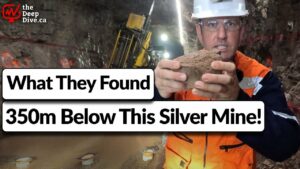
Despite numerous regulatory orders against it, the Cerro de San Pedro mine near San Luis Potosí, in northern Mexico, continues to operate. (Photo by Rurik Hernández.)
[Editor’s note: Business-friendly laws have made Canada the preferred legal residence for three-quarters of the world’s mining companies. But many of those companies actually operate in developing countries whose legal systems inspire little confidence, even among their own citizens. So when mining provokes conflict — a common occurrence at Canadian-owned sites around the worldshould those conflicts be heard in the country where they occur, or in Canadian courts, under Canadian law? That’s an argument that may be gaining a foothold. Thanks to the generosity of donors to the Tyee Fellowship Fund, journalists Liam Barrington-Bush and Jen Wilton have been exploring what Canada could do to better police the country’s global mining sector.]
Cerro de San Pedro, with the modest population today of just 97 residents, was founded 400 years ago as a mining town in the north of Mexico. It is located less than 10 kilometres from the outskirts of the state capital of San Luis Potosí, in a valley that is home to approximately 1.3 million people.
In 1995, Toronto-registered Metallica Resources Inc. began exploration work at an old mining site near Cerro de San Pedro. Soon after, a coalition of environmental groups and citizens concerned with the threats that the mine would bring to the arid valley, formed the Broad Opposition Front (FAO using the Spanish initials). Within a year, the FAO claims, Metallica began, “a series of illegal acts of dispossession, subterfuge and co-optation of officials, in order to seize the land where the [mining] project is [located].”
It’s uncontested that the company sought title to a large property. According to its own environmental impact assessment, issued in 1997, developing the mine would require the relocation of Cerro de San Pedro’s residents. The assessment also acknowledged that it could cause significant adverse impacts to the area’s only aquifer.
Vast amounts of rock and other materials were blasted and removed from the open mine pit, to uncover the underlying gold and silver. This method produces up to ten times as much waste rubble as an underground mine, leaving a vast crater and destroying the environment at the mine. At the site, cyanide is used to separate precious metals from non-valuable tailings, leaving toxic waste that is difficult to dispose of safely.
The FAO took its complaint against the miner to court. In 2004 it celebrated a victory, when an agrarian tribunal (which arbitrates land disputes in indigenous territories) ruled that the mine’s land lease was indeed fraudulent. In a separate case later that same year, Mexico’s Ninth Circuit Administrative Court cancelled the mine’s environmental permit. An appeals court upheld the latter ruling. Nonetheless, just two years later Mexico’s federal government issued the company a new environmental operating permit.
In 2008, the mine changed hands. Vancouver’s New Gold Inc. (TSX listing: NGD) acquired Metallica Resources, its concessions at Cerro de San Pedro — and the ongoing legal disputes surrounding the mining operation.
A year after New Gold acquired the mine, another Mexican court nullified the mine’s re-issued 2006 environmental permit as well. In response, Mexico’s federal environmental regulator (PROFEPA) ordered New Gold to halt its San Pedro operations. New Gold appealed the order and, while waiting for the appeal to be heard, resumed full operations in March of 2010. After protracted litigation, the requisite federal permits were again re-issued a year later, and the mine at Cerro de San Pedro resumed full production. (New Gold acknowledged receiving our request for comment on these events but did not provide a response.)
Despite its persistent local opposition, the mine remains in production today. The Cerro de San Pedro earned New Gold $34.6 million in revenue in the first half of this year, and is expected to produce at least 140,000 ounces of gold and 1.4 million ounces of silver during 2013.
Structured to limit losses
Canadian corporate miners have become adept at dealing with such challenges in potentially adverse environments. Indeed, the entire industry has been structured defensively, to contain losses.
Like other relatively high-risk sectors such as shipping — where every ship is typically owned by a stand-alone legal entity — the mining industry, particularly at the exploration phase, is made up of many single-purpose “junior” companies. These may have many shared directors and owners. But each company is usually only active at one or two locations, so that if it fails its loss won’t affect those owners’ other assets.
Thus Simon Ridgway, a leading figure in the B.C. mining sector for over thirty years, has held senior board or executive-level positions with more than a dozen different companies [http://investing.businessweek.com/research/stocks/people/person.asp?personId=7336819&ticker=RDU:CN] since 1996. Ridgway co-founded the Gold Group, comprised of six mining and exploration companies who all share a Vancouver office on Burrard Street. Ridgway is also CEO of five of these companies, and chairman of the sixth: Fortuna Silver Mines Inc. (TSX listing: FVI ).
At least four violent deaths and several lesser assaults have been associated with local resistance to Fortuna’s Cuzcatlán mine in Oaxaca, Mexico.
Ridgway subsequently left to develop mine prospects in Nicaragua and Guatemala, as president and CEO of Radius Gold Inc. (TSX-V listing: RDU.)
Radius Gold, too, has been associated with conflict. In 2012, an anti-mining community leader was shot three times and sustained serious injuries as she left a blockade near the entrance to Radius Gold’s Tambor mine in Guatemala. Two months later, the company sold the Tambor concessions, saying it was part of a “corporate strategy to divest problematic assets.”
(Efforts to reach Ridgway through several of his associated corporate offices did not bring a response.)
According to Jen Moore, Latin America program coordinator at MiningWatch Canada, an NGO focused on corporate accountability, Canadian stock exchanges, past and present, have played a critical role in facilitating the boom in junior mining firms. Moore says they have done so by providing finance for newer, riskier ventures, with fewer strings attached, than other markets would be willing to.
The Toronto Stock Exchange, she says by way of example, even after tightening its oversight after the Bre-X scandal of the early 2000s, still allows companies to list estimated mineral resources alongside actual proven reserves. In contrast, American exchanges bound by SEC regulation allow only proven reserves to be claimed — giving investors who may not understand the intricacies of the mining industry a clearer assessment of a company’s value.
Moore explains the sharp increase in the number of junior mining companies in Canada as “a way to offload the risk onto much more agile corporate structures that are designed to go in and lay the pieces for a project that could later be flipped for a lot of money to a bigger company.”
Accounting at home for actions abroad
Multiple corporate entities, designed to be sacrificed if necessary to limit their owners’ portfolio losses, are only one of the ways that Canadian mining firms are insulated from overseas liability.
Other countries make an effort to hold their corporate citizens to account for acts beyond their borders. Foreign plaintiffs who suspect companies based in the United States of committing criminal acts abroad, may sue in U.S. courts under the Alien Torts Claims Act. Germany and Belgium have similar legislation in place.

A mural in San José del Progreso portrays a bleeding Canadian flag on the coattails of the Grim Reaper, armed with a mining pick, who brings money and death to a sunlit countryside of people, animals and crops. The quotation from Pablo Neruda asserts: “We will win. We, the simplest people, will win. Although you don’t believe it, we will win.”
Canada, by contrast, has little legislation that can be used to hold companies to account for their actions abroad. According to a report by Oxford Pro Bono Publico, an award-winning legal project in Oxford University’s Faculty of Law, “The state of Canadian law with respect to … extraterritorial corporate social responsibility … is generally recognised to be insufficient.”
A precedent-setting case currently underway in Ontario may change that perception. Plaintiffs from Guatemala hope to hold Toronto-based Hudbay Minerals Inc. (TSX listing: HBM), to account for the actions of its Guatemalan subsidiary company’s security personnel, accused of murder, 11 counts of gang rape and other violence surrounding its El Estor mine.
Confronted with persuasive evidence that a fair trial on the issue was not possible in Guatemala, the company made Canadian legal history by agreeing that an Ontario court should hear the case. Even more remarkably, in late July, Ontario Supreme Court Justice Carole Brown overturned previous precedent, and rejected Hudbay’s legal arguments, to find that it could be held accountable in her court for its Guatemalan subsidiary’s actions.
As Cory Wanless, co-counsel on the case with Toronto’s Klippensteins law firm (which also represents anti-fracking activist Jessica Ernst in a lawsuit against the Alberta government), explained it: “We were arguing that the Canadian company in its head office in Ontario, was the one that set policy regarding community relations, set security policy and determined how they would interact with local peoples. And we say they did that negligently, and should be held responsible when things go wrong.”
A decision against Hudbay, “should send shock waves through the boardrooms of Canada,” Wanless says, “mainly because it shows that [corporations] are not immune. Canadian companies can and will be brought before a Canadian court and judged for their actions at their foreign operation.”
Whether Wanless wins the decision he’s seeking remains to be seen. “Unfortunately the legal road, while it might be open, is still a very difficult one,” he observed. With those hurdles clearly on his mind, the Toronto lawyer would like to see legal reforms that “made it easier for people affected by Canadian companies [abroad] to seek redress.”
Multiple Corporate Identities
Mining executive Simon Ridgway illustrates the industry’s fondness for wearing many company hats. Ridgway is:
Co-Founder of the Gold Group, a stable of metal mining and exploration companies whose motto is ‘Diversity, for a metal-hungry world’
Current CEO and Chairman of Cordoba Minerals Corp.*
Current CEO, Chairman and Director of Rackla Metals Inc.*
Current Chairman, CEO and Director of Medgold Resources Corp.*
Current CEO and President of Radius Gold Inc.* (formerly, Radius Explorations Ltd.)
Current Chairman of Fortuna Silver Mines Inc.*
Current Chairman and CEO of Focus Ventures Ltd.*
Current director at Niogold Mining Corp.
Former president of Pilagold Inc. (formerly called Thrust Resources Inc., Balaclava Mines Inc. and Pillar Resources Inc.). The company eventually merged with Radius Explorations Ltd. to form Radius Gold Inc. in 2007
Former director at Silver Quest Resources Ltd. (formerly Southern Rio Resources Ltd., now merged with New Gold Inc.)
Former president of Mar-West Resources Ltd.
Former chairman of Emerick Resources Corp. (now merged to form Medgold Resources Inc.)
Former chairman of Northland Resources S.A.
Former member of the Board of Advisors for Western Pacific Resources Corp.
Former director of Mena Resources Inc
* a member of the Gold Group
Reflecting Canadian values in the law
In 2005, the bi-partisan Standing Committee on Foreign Affairs and International Trade (SCFAIT) issued a report based on their work looking at the activities of Canadian mining companies in developing countries. It recommended that the government “establish clear legal norms in Canada to ensure that Canadian companies and residents are held accountable when there is evidence of environmental and/or human rights violations associated with the activities of Canadian mining companies.”
Four years later, the Government of Canada introduced a corporate social responsibility (CSR) framework for the Canadian extractive industries working abroad. Called “The Canadian Advantage,” the CSR strategy includes a non-binding set of principles for extractive companies, and pledges support for initiatives to help developing countries manage their mining, gas and oil sectors. The government also established the Office of the Extractive Sector CSR [Corporate Social Responsibility] Counsellor, which has a mandate to provide advice, and assist in conflict resolution between communities and Canadian extractive companies working abroad.
However, critics have questioned the effectiveness of the voluntary CSR code. In an article published in 2011, JP Laplante and Associate Professor Catherine Nolin of the University of Northern British Columbia called the government strategy “a tepid response that has no teeth.”
The CSR Counsellor is not able to sanction companies, and can’t even investigate complaints against one, without its permission. The government has so far ignored calls for a legally binding process to allow redress for mining-affected communities in developing countries.
Several backbench Members of Parliament have tried to win support over recent years for private members bills that would do just that. None have so far been passed into law.
In 2011, Peter Julian, NDP MP for Burnaby-New Westminster, tabled Bill C-323, the International Promotion and Protection of Human Rights Act. If enacted it would have established a judicial process in Canada for non-Canadian citizens to sue Canadian corporations for damages arising from violations of international law in foreign territories. It would have paved the way for victims of acts ranging from murder and rape to the contamination of local drinking water, to receive compensation. Julian’s bill died with the prorogation of Parliament.
Meanwhile the federal government is taking its own steps into the current legal vacuum. Prime Minister Stephen Harper announced in June that his government plans a new law that would require companies in extractive industries to disclose any payments they make to foreign national or local governments. A crackdown on bribing foreign officials would not, however, provide a pathway on its own to compensation for victims of corporate actions abroad.
In an interview with The Tyee at his Ottawa parliamentary office, MP Julian expressed concern about the “push back” by the current government against efforts to enshrine in law protection for foreign nationals from abuses committed by Canadian corporations abroad.
In Oct. 2010, Bill C-300, “An Act respecting Corporate Accountability for the Activities of Mining, Oil or Gas in Developing Countries,” lost by a margin of six votes (140 – 134). The purpose of the bill was to ensure that Canadian corporations receiving support from the Government of Canada, “act in a manner consistent with international environmental best practices and with Canada’s commitments to international human rights standards.”
While broadly supportive of the bill, MP Julian described C-300 as “a mild bill,” with “no real meaningful sanctions.” Yet not a single government MP voted in favour of the proposed legislation; all but one of the 140 “no” votes were cast by Conservative MPs.
Julian says he has found wide public support for a change in Canadian legislation, as he has travelled from coast to coast talking about the issue. Canada, he said, is getting a bad reputation internationally from the government’s uncritical support for the industry.
“The fundamental Canadian value that most Canadians would like to see,” Julian asserts, “is raising of standards around the world. What we actually see [at home] is the Harper government pushing down standards, so in many respects we’re looking at the worst practices rather than the best practices.” Julian points to the Harper governments repeal of the Canadian Environment Assessment Act in 2012, which, he noted, “eliminated, with the stroke of a pen, 99 per cent of environmental assessments.”
Julian sees little prospect of meaningful legislative change until Canadians elect a new government. “I have no doubt, if we had a referendum tomorrow on this issue, it would pass overwhelmingly,” the BC MP says. “But it’s not in the interests of the current government to do that. So they are going to try to sweep these kinds of situations under the table. And we can’t let that happen.”
Those who speak out are threatened or killed
“Now, what do you do in the meantime?” he asked. “For those folks [in countries where Canadian miners operate] who have no judicial system providing any kind of support, there are some appalling things going on,” Julian said. “The only thing [that can help] at this point is public exposure, that the public be aware of what’s going on. And it’s not an easy thing to say, because the people who speak out are often the people who end up being threatened or killed.”
That has certainly been true in many parts of Latin America, where shaky legal institutions have repeatedly proven insufficient to either deter or redress mining-related harms — whether to the environment or to human victims. Of the Guatemalans he’s representing in his trio of cases against Hudbay Minerals, lawyer Corey Wanless reflected: “You know, our clients are not asking for a lot. They are asking for, when something does go wrong, a place where they can be heard. That is a very basic right and a right that is hard to quibble with.”
While Canada’s courts deliberate, and MPs polish the language of new legislation, mining opponents are increasingly taking their arguments to a wider audience: the court of public opinion. “Communities are getting better informed and better prepared, even before projects start,” says MiningWatch Canada’s Jen Moore, “so you’re seeing more resistance.”
Rather than rely on any nation’s law, communities are sharing their stories directly with other mining-affected towns, says Rurik Hernández, an FAO activist involved in the fight against the Cerro de San Pedro mine in San Luis Potosí. “Five years ago we were the only ones in the country with the strength to resist these mines. But now we are seeing a lot of communities with our capacities, with our strength.”
“We know that our government is very corrupt and our future is dark,” Hernandez adds. “But we know that we have the ability to light a candle in a lot of communities and illuminate the darkness.”
With translation support from Joel Zurita and Lindsey Bryan.

















